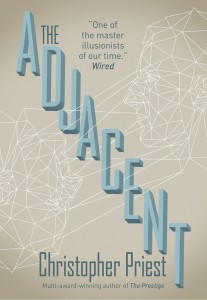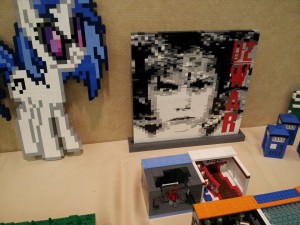written by Frank Dutkiewicz
The Wrong Foot by Stephanie Burgis (debut 11/1 and reviewed by Dustin Adams) is a fun and lively twist on the Cinderella tale. The initial premise exploring why the prince would need a shoe to fit instead of looking into the eyes of the woman he danced with, is quite clever (and true!)
Initially, “The Wrong Foot” follows Cinderella somewhat closely with too much humor, but as the tale continues this story begins to distinguish itself as its own tale – which is to be expected given where Cinderella ends. But what if the prince found the wrong girl (based solely on the slipper)? Would she even want to get married? Read for yourself to find out.
Wolf, or Faith in the Future by Michelle Ann King (debut 11/4 and reviewed by Dustin Adams) reminds me of a condensed version of The Bicentennial Man by Asimov. This story isn’t a typical story but more of a focus on two items that change over a long, undefined period of time: a dog and the weather.
The author notes, in this case, may be worth reading prior to the story as they could give a better appreciation for the meaning of the tale. The story is good but I feel it suffers from being too short. Then again the premise is worthy of a novel so anything less than 300 pages would likely feel too short.
The Girl with Flowers for Hair by Elizabeth Shack (debut 11/5 and reviewed by James Hanzelka)
Gina paused at Adam’s doorway and took in the room, particularly the crude drawings of a girl with flowers poking out of her head. It had been five years since he disappeared. The police had taken pictures but with no clues the trail had grown cold. She had bought him a new set of colored pencils for his thirteenth birthday just a couple of weeks ago. A silly gesture that Charles had told her to stop; they were both grieving in their own way. A door slammed shut and a voice she could never forget echoed through the empty hallway. “Mom, I’m home.”
This is a nicely told tale of loss and redemption but with a twist. The author does a good job of letting us into the world of Gina and Charles, two parents grieving for a missing child. A sense of loss soon replaced with joy as the missing child returns as if nothing had happened. The fabric of the story is woven well and the ending has a nice little twist. Give this one a read, it’s worth the effort.
Just the Facts: A Zombie Story by Cat Rambo (debut 11/6 and reviewed by James Hanzelka)
1. There are Zombies
2. Zombies are not particularly fast. There is even a comic called Late Zombie, where the hero zombie keeps showing up too late to eat the brain.
3. Readership has been declining lately.
4. The author of the comic has decided to visit the zombies, so she has constructed a Plexiglas zombie cage and had it placed in with the zombies.
5. Zombies are really boring.
This is another of the stories that uses a novel approach to presenting the material. I found it interesting and enjoyed the story, but I can see it may not be for everyone either because of format or subject matter. I thought the author did a very good job of building to the surprise conclusion, even though I could see it coming. Read the story and see if you can too.
Like Son Like Father by Jed Cole (debut 11/7 and reviewed by James Hanzelka)
I knew Felix was going to be a genius. When he was three he was playing with some garbage. Before the year was out he had built a prototype shelter, a tower that stretched above the oily clouds and debris left behind in the world. Those few of us left could now survive. Using twine, wood and scrap metal he built a bridge across the L.A. rift that nomad tradesmen still use today, five years later. Every day his huge form rises before dawn and he comes home late every night. But today he has shown me his latest work, one that brought a tear to my eye.
This was a really good story with a major twist at the end. Set in a time of post-apocalyptic Earth among a people trying to survive. One man’s child proves to be the savior of mankind, but is he one of us or something else? One of the best of the year, give it a try.
Recommended.
A long distant infatuation becomes an obsession for a reclusive woman in Breva by Nicky Drayden (debut 11/8 and reviewed by Frank D). Dr Gianna Nero is the foremost expert on the sSuryn language. The aliens, survivors of a decimated world, have asked for refuge on Earth in exchange for advanced technology. Their arrival was still forty years away when they first contacted Earth. An awkward young student, Gianna quickly picked up on the sSuryn emissary’s (named Breva) inflections and complicated speech until she alone understood all his nuances. The close attachment with Breva turns into an attraction. Anticipation and anxiety grows in Gianna as the sSuryn ships arrival nears, then disaster strikes. The alien ship is adrift and they need help.
“Breva” is a tale of fixation. Gianna is a girl who is an introvert. Breva serves as her online dream man, an ultimate outsider and loner. She is truly the only person in the world that understands him, leading to an odd fantasy she concocts in her imagination. As the day of Breva’s arrival nears, anxiety on her aging appearance and uncertain reception of their first meeting consumes her. All of that goes out the window when the alien ship suddenly goes silent with only a brief call for help as a last message.
“Breva” is told in staggered flashbacks at different points of Gianna’s life. They show a young Gianna as an odd bird trying to fit in at the university when the sSuryn are first discovered, to an early thirties scholar who has surpassed her boss as Breva’s interpreter, to the older expert who is threatened by a younger aide who is exceeding her understanding of sSuryn. The tale is rolled out like a mini epic. Gianna is a mirrored opposite of Ulysses, the monsters she battles are internal and the longing she experiences is not for home but for the adventurous beyond with a man who can never really be compatible. The story’s arc is a twist and its finale is an unexpected conclusion.
I found “Breva” to be an entertaining read. It read quicker than its long short story designation. It is a good work of sci-fi of an odd woman who falls into an odd relationship cultivating into an odd finale. How oddly natural.
An instructional guide on how to handle first contact with unknown aliens is the premise of Guidelines for First Contact in Simplified Technical English by Jetse de Vries (debut 11/11 and reviewed by Frank D). This detailed directive covers all eventualities, from the benign to the malevolent. If it doesn’t help, you never had a shot anyway.
This tongue-in-cheek offering is clever and thorough, a very well done work of humor.
A fallen god plies a new trade in The Book of Love by Michael Haynes (debut 11/12 and reviewed by Frank D). Angus is a drifter, frequenting bars and taverns as he travels. He carries around a magical book. In it, words about love become true. Pete, Angus’s latest customer is suspicious but agrees to pay the former god’s asking price.
Mike Haynes is a writer who never fails to impress me. Angus’s magic is real but he still comes off as a charlatan. He hesitates with Pete but the man agreed to his double-the-price offer immediately. The tale has a sweet twist at the end. Worth the read.
A queen is focused and determined to complete The Machine by Sean Robinson (debut 11/13 and reviewed by Frank D). She is the Mistress of Science and her machine is the pinnacle of her achievement. Nothing will stand in her way to complete it. She can’t be bothered by minor matters like a collapse of the environment. Nor will she let anyone stop her, not even her husband. He will help her, one way or another.
“The Machine” is a disturbing look on obsession. It is the only thing that matters to her. My only objection to this piece is I had no idea what the purpose of the machine was.
Life goes on, even when a part of you has died. Die for You by Alex Gorman (debut 11/14 and reviewed by Frank D) is the tale of a married couple after an alien invasion. Much has changed, including their relationship.
“Die for You” is the aftermath of a cowardly man. He had let his wife down, and can never regain her respect again. A hard but good tale.
The stories Kirk tells during bath time take on a life of their own. From Tuesday to Tuesday by Peter M Ball (debut 11/15 and reviewed by Frank D) is the tale of two people existing in their own bubble of a relationship. Every Tuesday, Deanna takes a bath and begs for a story from her boyfriend. Kirk’s stories have an unintended consequence of altering reality. His life changes the next morning – a new profession, a change in scenery, and a different Deanna , for the entire week.
“From Tuesday” is a tale of regret. Kirk tires of the Tuesday changes, and has vowed to never tell another tale again, but Deanna has a way of pulling a new one out of him. The relationship the two have is a dysfunctional one. They are two dysfunctional people caught in a dysfunctional, yet changing, reality. I am frankly puzzled why the two remained together. Kirk frequently reminds himself that he does not love her. Deanna’s own words make it clear she has little respect for him. Much of the tale is less about the different reality that faces Kirk after the Tuesday’s, but of the odd dynamic about the two.
The underlying message in this piece of two people who are caught in a relationship stuck in an endless loop regret. I believe the tale serves as a metaphor for relationships that are bounded by familiarity rather than compatibility. I have a simple solution for their dilemma: seek counseling.
The protagonist reflects on When The World was Full of People by Patricia Russo (debut 11/18 and reviewed by Frank D). A familiar face is seen across the street. A man who looks like the protagonist’s brother is loading large bottles of water. He plans to plant a flower the protagonists knows doesn’t exist. But plant he does, and grow they do.
“When The World” is tale of reflection. I confess, the point of the piece was lost on me.
The old Omega meets the new Alpha in The First Stone by Wren Wallis (debut 11/19 and reviewed by Frank D). The protagonist’s ex, hands him an unassuming stone, the first stone of creation, just as time comes to a stop. Creation is ending and the old creator is passing off the job of a new creation to him. The protagonist is overwhelmed and knows he is underqualified for the task, but knows who is qualified to fill it.
“The First Stone” is a religious themed tale. The protagonist is cast as character who is the wrong person at the right time. I found the ending of this tale predictable.
A loyal employee underestimates his worth in Final Inspection by Afalstein JD Kloosterman (debut 11/20 and reviewed by Frank D). Wilfrid is an inspector on an assembly line in an automated factory. He has done the job for decades and seeks retirement. His life has been within the plant for years , company policy on contamination making it impossible for him to leave. He has repeatedly requested a leave but the company has said that they are unable to fill his position. The changing products the line produces makes him wonder , the hospital beds and farming equipment that used to be assembled have given way to advanced weaponry. Just what is going on outside anyway?
“Final Inspection” is a tale of complacency. The unseen management is content with Wilfrid and has no intention of making a change, despite the fact his presence inhibits the functionality of the plant. There is a hint of a ‘Terminator’ type of world out there, but the enclosed environment of the plant keeps Wilfrid in the dark.
Inventive tale. I rather enjoyed it.
The devil barters to end a man’s pain in Screwtape by Helen E. Davis (debut 11/21 and reviewed by Frank D). All he offers the man is a favor, vowing to leave his soul untouched. An individual soul is valuable to the devil, but with this one customer, he can accomplish a lot more without his.
Timing matters a lot, and the debut of this tale hinges much on its timing. The story has a nice twist for a finale. Very cleverly done.
A girl, a kiss, and an invitation to follow is all it takes for a young man to seek The Patient Stars by Ryan Simko (debut 11/22 and reviewed by Frank D). The protagonist has a chance meeting with the girl of his dreams. She teases him to find her in the emerging settlements of space. Thus begins a desperate game of hide-and-seek.
“The Patient Stars” is a chase. The protagonist is in pursuit, searching entire worlds to find the girl he met in a chance encounter on one lonely night. He travels across the stars, aging slowly as he jumps from world to world. Human civilization grows around him and leaves him behind; an old relic of a long gone age.
“The Patient Stars” is more of future history of the rise of galactic man than it is about one man’s search for a woman. Although I did appreciate the view of our future us, the story never had a destination for the reader.
A gladiator is near his freedom in Three is a Sacred Number by Carrie L. Cadwallader (debut 11/23 and reviewed by Frank D). Kloth is a blue skinned alien, champion of 99 bouts. One more and he’ll win his freedom. Only one other has accomplished that feat, and that champion doesn’t want to see his record matched.
“Three” is an alien tale. The hero is a slave forced to fight. He doesn’t savor in the glory but the exercise has made him a hard individual. Interesting tale. It left me intrigued.
Your right to exist will be allowed once you can claim that I Have Read the Terms of Use by Kenneth Schneyer (debut 11/26 and reviewed by Frank D).
“I Have Read” is a legal document for those about to be born. A very clinical (and humorous) look if birth was a legal agreement.
An endless winter grips two lovers in The World Will End in Fire by K. C. Norton (debut 11/27 and reviewed by Frank D). The world is freezing, and for the protagonist and his wife, staving off the inevitable becomes a pointless exercise. Viva does not want it to end this way and prefers to choose a brilliant way to leave the world.
“The World” is a tale of two people faced with the end of the world. The sun has gone out and whatever warmth is left is quickly evaporating. The story is a small slice of two people’s life in the final act of a greater tragedy.
Remembrance in Stone by Amanda C. Davis (debut 11/28 and reviewed by James Hanzelka).
Fire is pain and air does not quench it. If Gera had lived to teach her air, she’d be prepared. Instead the runes fell on her shoulders. Gera had taught her water, but even when she enters the sea she is swept away by it. Rolled and tumbled until she is nearly dead, then the sea spits her out as if tired of her presence. She starts a fire that does not warm her, calls a wind that does little to dry her. Finally she wanders back to the house and stares at the rectangle where Gera lays. She wasn’t even able to cut the lines straight. If only Gera had lived to teach her.
I found this one a little jumbled and confusing. The writing was so vague that I never did really identify with the character. Then, at the end of the story, the main character makes an abrupt change in demeanor and thought process. It’s almost as if the author said, “OK time to end the story and make the character change her perception.” It simply didn’t work for me. The author spent so much time setting up the conflict that the ending was disappointing.
Tell Me How All This (And Love too) Will Ruin Us by Sunny Moraine (debut 11/29 and reviewed by James Hanzelka).
You were screaming when I pulled you from the boat. I’d bound your legs with steel poles and doused you with whiskey. I thought you might die in peace, and I made myself ready for my own death. By the time we reached the island it was sunset, and I pulled the boat ashore. I made a fire from driftwood and wrapped you in blankets. How much of this will you remember? Enough to care? I’ll show you in the most vicious way possible. You may be lucid, but that’s another thing I’ve given up caring about.
We seem to be in a month for strange surreal stories. This is another one I never really understood. The author chose to weave a disjointed tale about two people, at least I think the other being is a person because it is told in a somewhat rambling soliloquy and I was never sure who or what he was prattling on about. About two paragraphs in I wished I’d never started it. So maybe there is a good story in there you can find, I certainly couldn’t.
A Year of Outstanding Work
Although we have yet to publish our December’s reviews, I would like to give you my top ten choices for the year. Give them a look. If you like any of them enough, consider nominating one for the upcoming Million Writers Award. I have my pick for the year.
Love’s Footsteps by Cat Rambo
“A Phone, My Heart, and Maybe My Last Shred of Dignity” by Luc Reid
“Five Minutes” by Conor Powers-Smith
“The Bargain” by Henry Szabranski
“Holy Diver” by Gra Linnaea
“Such Days Deserved” by Lee Hallison
Sparg by Brian Trent
The Perfect Coordinates to Raise a Child by Barbara A. Barnett
Highest Possible Setting by Em Dupre
And†�
Melancholia in Bloom by Damien Walters Grintalis
In my June review, I compared Ms Grintalis’s story to some of the best Twilight Zone episodes ever to debut on TV. “Melancholia” is sad, beautiful, and special. It had an ending that was bitter, but as I pointed out in my review†�
“†�(the) Twilight Zone proved that the very best tales don’t have to have a happy ending for them to be enjoyable. In fact, the bitterest endings in that show are where it achieved its greatest accolades, and like those memorable but bitter episodes this story deserves praise reserved for a true classic.”
If there ever was a published Daily SF story that deserved an award, “Melancholia in Bloom” would be it. I will be nominating it for the Million Writer’s Award. It has earned it.
 Frank Dutkiewicz has put his snooty and pretentious opinions to good work as a full time finalist judge for On The Premises. A guest judge in the past, he will now help decide the winners of the tri-annual online magazine every issue.
Frank Dutkiewicz has put his snooty and pretentious opinions to good work as a full time finalist judge for On The Premises. A guest judge in the past, he will now help decide the winners of the tri-annual online magazine every issue.
On The Premises is a contest publication. Each contest challenges writers to produce a great story based on a broad premise supplied by our editors. Here is their mission statement.
Our Purpose
On The Premises aims to promote newer and/or relatively unknown writers who can write what we feel are creative, compelling stories told in effective, uncluttered, and evocative prose. Entrants pay no fees, and winners receive cash prizes in addition to exposure through publication.
For writers eager for a fair shot in the publishing world, On The Premises is a blind read contest , all entrants are instructed to submit their work without their name on their script. From the award winning authors to first time writers, all have an equal shot.





 Attending a convention with a four-year-old is a surreal experience.
Attending a convention with a four-year-old is a surreal experience.




